The 78th Cannes Film Festival came to a close Sunday evening, ending eleven days of predictions, speculation, and gossip with a businesslike awards ceremony that was more subdued than celebratory.
The general consensus? Juliette Binoche and her jury did what they could with what they were given. The 2025 winners were mostly fair and decidedly cautious—safe choices in keeping with a lineup that never quite caught fire. That description, frankly, could apply just as well to many of the films themselves.
In all my years watching Cannes unfold, I can’t recall a lineup so crowded with low-scoring entries. It doesn’t just feel like a coincidence—it begins to paint a portrait of a Competition slate that seemed to be struggling to find its footing. Whether it’s a matter of bold swings that miss or simply muted ambition, the pattern was hard to ignore.
The bottom tier of the Cannes Screen Jury Grid was composed of an inordinate amount of low scores: “Fuori” (1), “Alpha” (1.5) “Eddington” (1.5), “Eagles of the Republic” (1.9), “Woman and Child” (1.9) “History of Sound” (1.9), “The Little Sister” (2), and “The Phoenician Scheme” (2.3).
And yet, Cannes always leaves behind something—fragments, moments, discoveries that stick with you. I left the Croisette having experienced a handful of films I won’t soon forget: “Sirat,” “The Mastermind,” “Nouvelle Vague,” “The President’s Cake,” “It Was A Simple Accident,” “Die, My Love,” “Sound of Falling,” “Urchin,” “Nino,” “The Plague,” “Two Prosecutors,” “Young Mothers,” “Splitsville,” and more.
A few days ago, I wrote about the thunderous ovation that greeted Jafar Panahi’s “It Was A Simple Accident.” It’s a road movie, thoughtful and quietly significant—a film that gains weight not only from what’s onscreen but from the conditions under which it was made. When Panahi, long imprisoned and silenced in his home country, entered the Palais for his premiere, the audience rose in a standing ovation that seemed to stretch on forever. It wasn’t just about cinema. It was about survival. That said, the critical response may have leaned too far toward reverence. Sometimes we applaud the filmmaker’s courage and circumstance more than the film itself.
This was Neon’s sixth straight Palme d’Or, but the least surprising one since the indie studio had bought off the field during the festival, collecting Palme contenders as if they were infinity stones, and practically making it impossible for them not to get number six.
For me, the highlight came early. The Camera d’Or for best first feature went to Hasan Hadi’s “The President’s Cake,” a quietly devastating film and a milestone in Iraqi cinema. It marked the first time an Iraqi film competed at Cannes and took home not just the Camera d’Or, but the Audience Award as well. Set in 1990s Iraq, the story, with shades of De Sica, follows a nine-year-old girl tasked with baking a birthday cake for Saddam Hussein—a real, state-mandated exercise during that era. With her grandmother at her side, she sets out across a crumbling, oppressed society in search of ingredients. What unfolds is a tender and clear-eyed portrait of innocence under siege. It’s the kind of debut Cannes is supposed to discover.
Then there was “The Secret Agent,” Kleber Mendonça Filho’s film that walked away with awards for both directing and acting. I admired the craftsmanship, the confidence of it. But I didn’t feel moved by it—not this time. By the end of the festival, even strong films can suffer from the viewer’s exhaustion. Some works are best appreciated on a quiet Monday morning, far from the Croisette and its distractions. I’ll give it another look then.
Joachim Trier’s “Sentimental Value” won the Grand Jury Prize (second place). This was a story that followed two sisters, Nora and Agnes, as they reunite with their estranged father, Gustav, a once-famous director who offers Nora a role in his comeback film. When she declines, he casts a young Hollywood star instead, forcing the sisters to confront their fractured bond.
Trier’s film, although well-loved by Oscar-minded critics who attended the fest, didn’t do as well in the international critics grids. I loved the first 3/4 of this film, which had an Oscar worthy Stellan Skarsgård playing a father in a battle of wits with Renate Reinsve’s daughter — Trier couldn’t find the proper way to end his film, and resorted to forced tears instead of nuance.
Most of the jury’s decisions felt justified. One did not. Best Actress went to Nadia Melliti for “La Petite Dernière,” where she plays a closeted Muslim lesbian in rural France. It’s a brave performance, and a timely story. But how it edged out Jennifer Lawrence’s searing, full-bodied work in “Die, My Love” is beyond me. Lawrence gave the kind of performance you don’t forget—raw, real, and utterly exposed.
The Jury Prize was split between “Sound of Falling” and “Sirat.” Both are formally daring. “Sirat” was the best film I saw this year. I watched “Sound of Falling” again just yesterday and was struck anew by its quiet beauty—an impressionistic portrait of a German family across generations, told with a painter’s eye and a poet’s patience.
Beyond the awards and premieres, there was a strange unease in the air this year. Art-house cinema is becoming harder and harder to sustain. Filmmakers we once relied on are struggling to fund new projects. The industry feels uncertain, stretched thin. And yet, the spirit of Cannes endures. The audience still cheers. The lights still dim. And Neon—bless them—still scoops up what others are too cautious to touch.
Cannes didn’t shake the earth this year. But it left behind its share of quiet tremors. Sometimes that’s enough.






